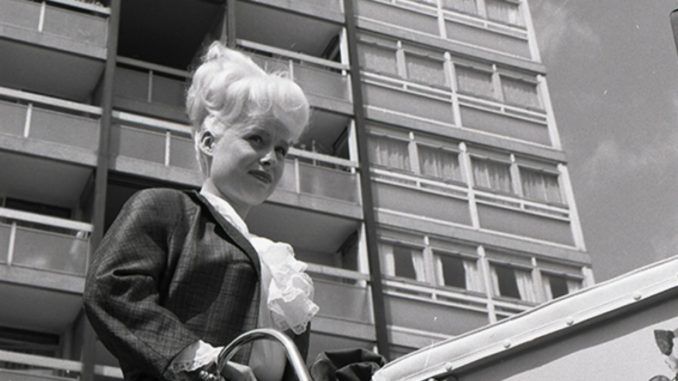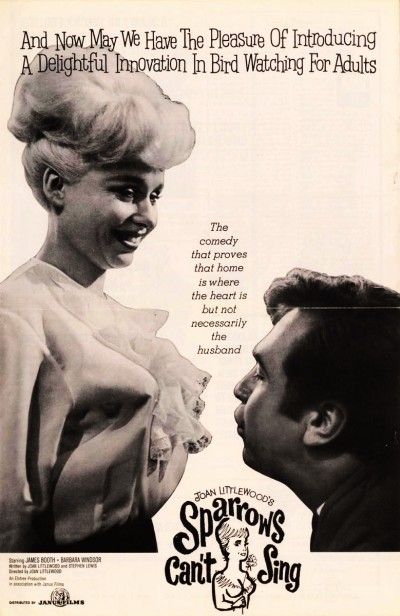
Rating: C-
Dir: Joan Littlewood
Star: James Booth, Barbara Windsor, George Sewell, Roy Kinnear
Back before Barbara Windsor was Peggy Mitchell, the queen of Albert Square, or even the favoured dolly-bird of the Carry On franchise in the sixties, she was a well-regarded actress on both stage and screen. Windsor got her break in the musical Fings Ain’t What They Used to Be, also directed by Littlewood. This was her only feature film: she was much more successful in the theatre, becoming the first woman director nominated for a Tony award. Though nominally classified as a comedy drama, and despite being full of well-known names including Kinnear, Arthur Mullard, Brian Murphy and Yootha Joyce, it’s much more along the lines of the British sixties kitchen-sink drama its title suggests. I don’t think I laughed once.
It begins with the return to the East End of Charlie Gooding (Booth), who has been away from home for two years as a merchant seaman. He’s looking forward to reuniting with his wife, Maggie (Windsor), and his child. But the omens for the resumption of their relationship are poor, most obviously their house having been knocked down for redevelopment. He eventually locates Maggie, who finds the return of her husband rather awkward, since in the time since, she has taken up with local bus-driver, Bert (Sewell). Maggie seems to have enjoyed her freedom, and is no longer at all sure whether or not she wants to go back to her former married life.
 Credit is due for shooting on location: it’s an impressive record of the East End at the time. I’m also fairly sure it’s the only movie to have had its world premiere in Mile End, with after-party drinks in a club owned by the Krays. [The brothers visited the set on occasion] But there’s only so much cheery and chipper Cockney banter I can take – it was apparently the first English film to require subtitles for its US release – and the serious lack of anything much happening beyond relationship angst became incredibly wearing on me after a while. Most of the individual scenes are okay, though Littlewood’s style is very static, and it’s obvious she was more a theatrical director than a cinematic one. Even when she moves the camera, it feels like she’s adjusting delicate china.
Credit is due for shooting on location: it’s an impressive record of the East End at the time. I’m also fairly sure it’s the only movie to have had its world premiere in Mile End, with after-party drinks in a club owned by the Krays. [The brothers visited the set on occasion] But there’s only so much cheery and chipper Cockney banter I can take – it was apparently the first English film to require subtitles for its US release – and the serious lack of anything much happening beyond relationship angst became incredibly wearing on me after a while. Most of the individual scenes are okay, though Littlewood’s style is very static, and it’s obvious she was more a theatrical director than a cinematic one. Even when she moves the camera, it feels like she’s adjusting delicate china.
The problem is more the lack of much dramatic tension. Sure, you have the “will they or won’t they get back together?” question. But I was left never particularly bothered by the outcome. Both Charlie and Maggie seem to have handled life on their own perfectly well, and though Maggie needs someone to care for her child, finding that person wouldn’t appear to be a problem. It has largely faded from memory since, despite Windsor being nominated for a Best British Actress BAFTA for her performance; she lost to Rachael Roberts for This Sporting Life. There is a certain poignancy, especially in lines like when she talks of Charlie: “Apart from his boozing and going with other birds, he was always very good to me.” But there’s good reason this has been forgotten.
